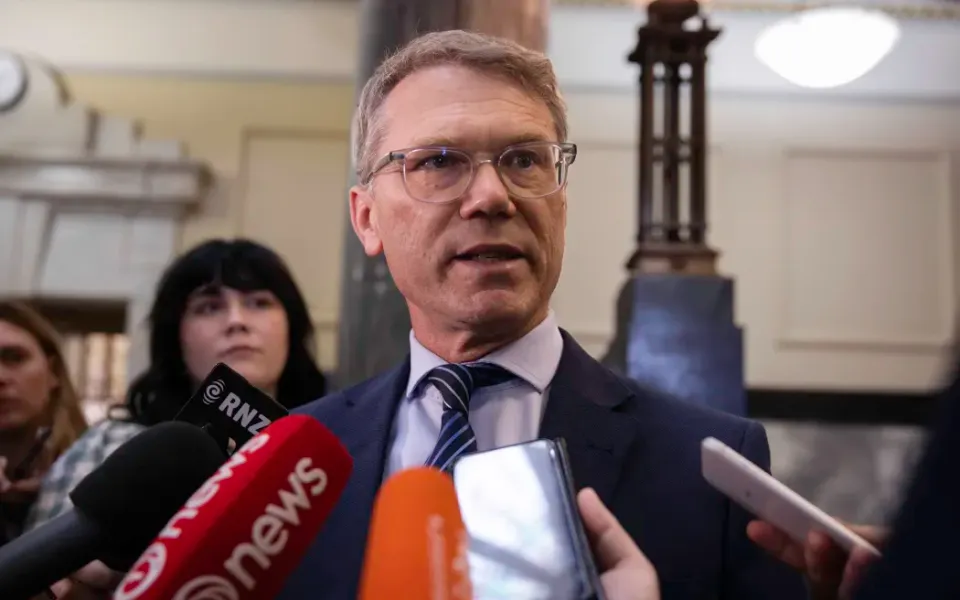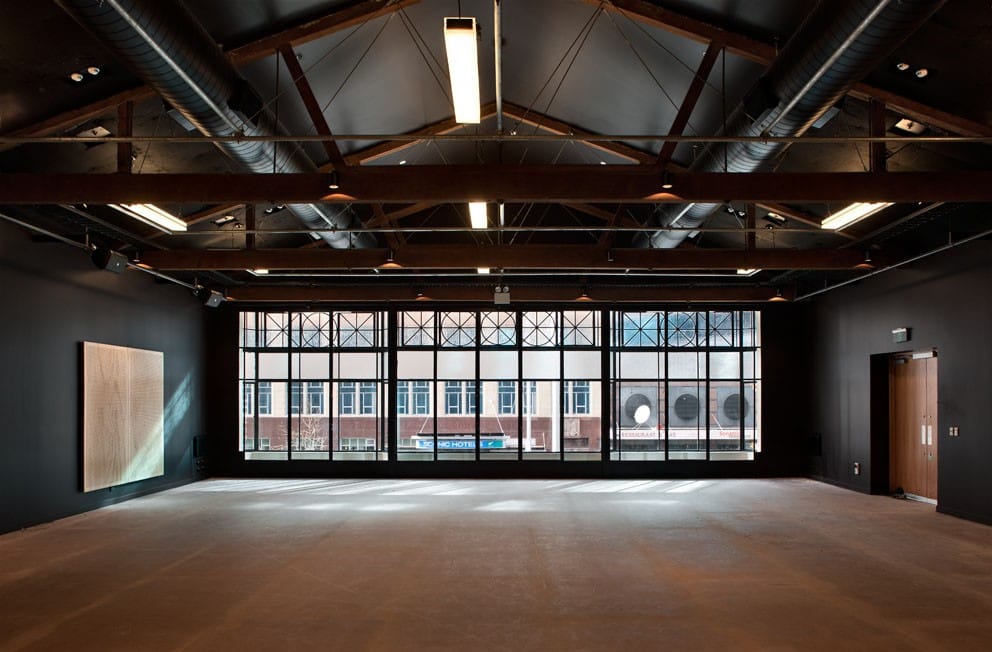A blank page: Minister Paul Goldsmith introduces himself to the arts sector

Last night, the Minister for Arts, Culture and Heritage Paul Goldsmith introduced himself to the arts sector during a one hour whakawhanaungatanga at Q Theatre. Here’s what went down.
The last time we had a Minister for Arts, Culture and Heritage from a National-led government, it was Maggie Barry. In theatre lore, she is remembered for saying, at a 2016 Auckland Theatre Company opening, that a way of combatting declining revenue from Lotteries, was to go see shows, give to the arts, or buy more Lotto tickets. A bleak thing for a Minister for Arts, Culture and Heritage to say to an audience of people who were seeing a show for free, herself included. (The actual quote in question comes from the now-outgoing Chief Executive of Creative New Zealand, Stephen Wainwright, in a press release.)
The prospect of an incoming Minister for Arts, Culture and Heritage from a right-wing government is not an especially warm one for the sector. While the National party has largely remained silent on the sector, the ACT party’s spokesperson for the arts, culture and heritage, Todd Stephenson, condemned CNZ for “handing” poet Tusiata Avia an award, before further threatening the organisation by saying they were “tempting fate”.
It doesn’t help matters that Goldsmith has four portfolios in total, including Justice (pretty big), Treaty of Waitangi Negotiations (ditto), and State-Owned Enterprises (yep). By the end of the last term, Minister Carmel Sepuloni held five portfolios total, sliding into the last weeks of the election without any arts, culture and heritage strategy to campaign on.
Last night’s chat at Q was a chance for the sector to get to know Goldsmith, figure out what his priorities for the sector are (if any), and essentially scope him out. Were we going to get a Chris Finlayson minister, a minister genuinely invested in the sector? Were we going to get a minister scattered across portfolios, burning out over three, six or nine years? Or were we going to get a slash-and-burn type minister, making vanity cuts to a sector whose skin is so close to the bone already that there’s barely any flesh to get through?
After last night, I’m not so sure where he sits. And that’s worrying.
In the chat, moderated by Miriama McDowell, Goldsmith acquitted himself well but blandly. He didn’t say anything actively offensive, if you discount the fact that he can’t name a single Māori play (which is, I think, very bad). He dropped the phrase “art should comfort the disturb, disturb the comfortable”, although I would question what else he knows about Cesar A. Cruz. He listened, as carefully as a politician with fifteen years’ experience, and a biographer with two decades experience, would be expected to listen.
Goldsmith’s been doing this for some time. The one gotcha he has experienced as a Minister – about his Māori heritage, which he also cleared up at this event – came due to the friendly fire from Paula Bennett. Bennett was nowhere to be seen at this event, for better.
Throughout, he managed to display a better engagement with the arts than your average New Zealand man of his age and demographic might. The last show he saw? Something Rotten at the Court Theatre. His favourite Shakespeare play is Macbeth. He has been to Basement Theatre. He’s into Brahms. The waiata he has in his back pocket? Te Aroha, unsurprisingly. He was even familiar with the infamous story about the opening night of Jesus Christ Superstar (if you know, you know).
It took 25 minutes for the name Tusiata Avia to come into the room, explicitly. Goldsmith stopped short of condemning the Act Party’s screed against one of the country’s most celebrated poets, but admitted that he had read Avia’s book (whether he meant The Savage Coloniser Book or Big Fat Brown Bitch is unclear) and found that when it came to the disturb versus comfort dichotomy, it was “on the disturbing side”. While Goldsmith may have been physically seated upon the brown leather couches which will be familiar to anybody who has been to Q Theatre, he was spiritually residing on a fence.
Throughout the event, five speakers from the arts sector were asked to speak – Dolina Wehipeihana, Brent Eccles, Amber Cureen, Jon Tamihere-Kemeys and Leki Jackson-Bourke – representing theatre, dance, music, with a crucial (and necessary) speaker representing and talking to disabled artists. Programming an event like this, if you can call it programming, is a tough task. The sector is as diverse as the world it represents; three speakers can’t do it, three hundred speakers can't do it either. There’s no chance five speakers could do it, even given an hour.
Despite this, they managed to touch on issues and talking points that will be old hat for many in the room. New Zealand overachieves internationally despite being underfunded. The government’s investment in the sector during Covid was significant, but without continued investment, many organisations will struggle. So many of our venues are inaccessible to disabled artists, and audiences. The inconsistency of liquor licensing laws, and how it impacts the live music industry, brought up by veteran Brett Eccles was new to me, and is something I’m personally keen to learn more about.

The closing of the chat was the most important part, and the most worrying. What was Goldsmith’s vision for arts, culture and creativity in New Zealand? How was he going to engage with practitioners? In short: What does he need from us?
He ruled out an UBI, unsurprising. He said he would be looking closely into CNZ and the “back office”. He wants to build a “strong, growing economy that allows us to invest as broadly as possible”, which is a very rhythmic way of saying not a whole lot.
In the interest of transparency, I’ll give Goldsmith’s answer to this question in its entirety:
“All of us come from our own backgrounds, I know a lot about classical music, and history, and the things I know about, but the great joy of politics but also the government is that it allows you to go into new areas and meet people and be challenged and also to see the broader world. I don’t claim any expertise in reo plays, but I’d love to see more of them.
"I’m keen to meet as many people as I can over the next few months and I would say in terms of strategy we’re working something up and when we do we’ll put it out as a starting point. Everybody can attack it to hell and come up with a better one and we’ll have a conversation and take it from there.
"I’m sure it will be contested. We should never be surprised that people have different views on these things, and as a country we should never be surprised that there’s always tension between what people want to do and how to spend limited resources. These things are natural, and certainly my goal is to go about it in a positive, respectful way, and I think there are important questions.
"We’re a small little country trying to our best.”
McDowell’s response, before a gracious conclusion? “Fair.” As for your own conclusions, as a sector I’m sure you can use your own arts, culture and creativity to draw them.
As a writer, a blank page is both an opportunity and a terrifying prospect. It could lead to the best work I’ve ever done, shining light on a part of the world that needs a little more. It could be the worst thing I’ve ever done, never able to be buried deep enough. Coming out of last night’s chat, I wasn’t thinking about how Goldsmith’s blank page in regards to our sector could be an opportunity or terrifying prospect.
I was thinking about how mortifying it was that it was still blank.
This post is available for free to Dramatic Pause subscribers. If you wish to become a paid subscriber, you can upgrade here.
Member discussion